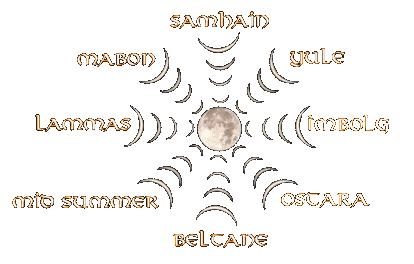
The Pagan Sabbats

Pagans celebrate eight Sabbats, which are loosely based on the old agricultural festivals of our ancestors. No one culture seems to have actually recognized all eight, and they may have representd different things. For example, the Celts did not celebrate Ostara or Mabon, and for them Samhain was the New Year; the northern teutonic tribes, however, celebrated their New Year at Yule, and did not celebrate Beltane or Lughnasadh. Modern-day pagans have taken the best from each culture and combined it to bring meaning to their lives.
Although the Sabbats started out as agricultural festivals, marking the planting and harvesting of the crops, they began to take on deeper religious meanings. The Sabbats represent the turning of the Wheel of the year, and with it, the Wheel of Life. Each Sabbat is a stage in the life cycle of the God and the Goddess. The God lives, dies, and is reborn. The Goddess makes the journey from Maiden to Mother to Crone and back to Maiden. We do rituals at Sabbat-time to honor the deities, ensure fertlity, and acknowledge and celebrate the turning of the Wheel. To our ancestors, Sabbats were joyous times. They threw great parties, played games, told stories and sang, and of course ate and drank tremendous amounts!
With the coming of the Christian Church, the pagan holidays were forced underground. Despite years of persecution, however, the Church could not achieve the complete destruction of the old pagan holidays! So it tried to "overwrite" them, by installing its own holidays on top of the pagan ones. Thus we find Christmas celebrated at Yule, Candlemas at Imbolc, Easter at Ostara. (It is also interesting to note, although this doesn't have much to do with Sabbats, that the god Mithra was born of a virgin, in a barn, on December 25, died and was reborn, and is supposed to return at the end of the world for his chosen!) But pagans are persistent folk, and the old ways survived even under the veneer of Christianity.
The word Sabbat comes from the Greek word "sabatu," meaning "to rest," and so it has become traditional not to do any magick workings on Sabbats, unless there is a true emergency! Modern pagans, just like their ancestors, eat, drink, and make merry; tell stories and sing songs; and have feasts!
| Samhain: October 31 | Yule: Winter Solstice | |
| Imbolc: February 1 | Ostara: Spring Equinox | |
| Beltane: May 1 | Litha: Summer Solstice | |
| Lughnasadh: August 1 | Mabon: Autumn Equinox |